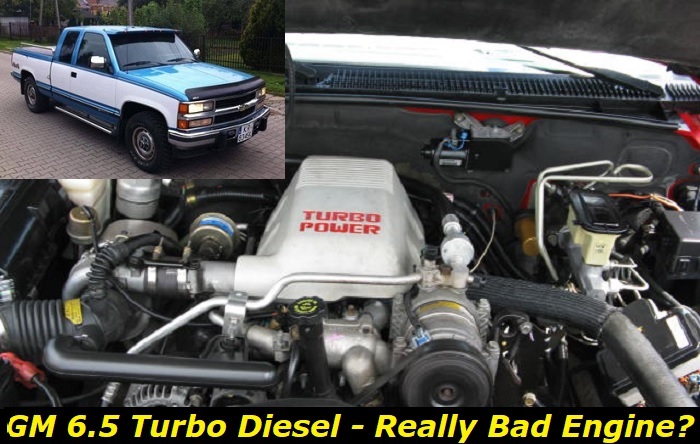The GM 6.5 Turbo Diesel engine has gained plenty of attention during its run all for the wrong reasons. That's because it's hard not to think about problems when talking about it. The unit has garnered so much notoriety that most truck enthusiasts will advise you to steer clear of it.
They say it's hard to go wrong with GM due to its long-standing reputation. However, if there's an exception, that would be this product. The 6.5 Turbo Diesel was so rife with problems stemming from poor design choices on the part of its maker, and if you are to buy a vehicle equipped with it now, that would be exacerbated by issues that come with its age.

Key features and my opinion about the engine
- Production years:1992-2005
- Average lifespan of Detroit Diesel 6.5:260,000-300,000 miles
- Fuel supply type:direct diesel injection
- Power range:160-215 hp
- Fuel efficiency:bad
- Engine block material:cast-iron
- Engine reliability score:high
- The most common problems:injection pump issues, electronic control problems, turbo problems, issues with head gasket.
Key Features of the Engine
In 1992, GM created the 6.5-liter, 397-cubic-inch engine - Detroit Diesel V8. Initial iterations of the engine claimed 190 horsepower and 380 lb-ft of torque, outperforming the 6.2-liter it replaced. The motor's power eventually increased in a few specific applications, and its stated output performance was 215 horsepower and 440 lb-ft of torque.
The 6.5 turbo diesel's high levels of power and torque made it ideal for towing and hauling tasks. It also had a fast acceleration, making it great for those who needed quick response times from their engine.
The 6.5 turbo diesel engine was quite popular during its time mainly because it powered a wide range of vehicles including pick-up trucks, SUVs, vans, and military vehicles. Its fame was due to the fact that it was made by GM, too, and its predecessors had quite a reputation in the industry.
In addition to its high performance, the engine promised durability with its sturdy internal components and robust build quality that was designed to withstand heavy use. It claimed higher fuel efficiency than its predecessors as well even when used in larger vehicles such as SUVs and vans.
Unlike the other engines of GM which received quite a cult following, the 6.5 turbo diesel aged quite poorly as it received complaints from one owner to another. The engine was eventually discontinued in the early 2000s.
Longevity of the Engine
Despite its discontinuation and bad rep, there are still vehicles that use the factory versions of the GM 6.5 Turbo Diesel up to this day. The fact that some made it this far is a testament that they can last a long time.
Contrary to popular belief, the average life expectancy of the engine is 140,000 miles. A few have even survived over 300,000 miles according to some reports. If this is the case, then, they may not be as bad as everyone thinks. Its use in military vehicles is somehow one of its redeeming factors, too.
Known Problems of the Engine
It's not that hard to find someone ranting about the GM 6.5 Turbo Diesel. Even though most versions of the engine that are being sold nowadays are already rebuilt, there are still plenty of problems attributed to them.
According to disgruntled reviews and reports concerning the engine, here are its common problems:
1. Injection Pumps Design Flaw
The head and rotor design of the early model GM 6.5L Turbo Diesel injection pumps were quite controversial. They tend to result in a hot start failure when pumping thin fuels, whether they were thinned by heat or were just thinner alternative fuels. The positioning of its black box also contributed a lot to the heating problems.
This was addressed by GM with an update featuring a better head and rotor design, which is now the norm for all high-quality new rebuilds. Likewise, the black box was moved a bit farther from the engine to address the heating issue.
When buying an auto with an engine, you should confirm that it comes with an updated head and rotor. Some could attempt to market a cheap rebuild by omitting this crucial component. If you happen to have scored on one that has not been poorly rebuilt though, you may have to fork out $1,600 to complete the job with a mechanic.
2. Injection Pumps Failure
There are a few different causes of injection pump failure in GM 6.5L turbo diesel engines. One common cause is the contamination of the fuel system. This can happen if water or other contaminants get into the fuel tank or lines. Another is regular wear and tear on the pump itself. Over time, the moving parts inside the pump can wear down, causing it to fail. One more likely culprit is the use of substandard parts during the rebuilding process.
If your GM 6.5L turbo diesel engine is experiencing injection pump failure, there are a few symptoms that you may notice. The engine may run rough or misfire, and you may also notice a decrease in power and fuel economy. In some cases, the engine may even stall.
There are a few different solutions for fixing an injection pump failure. One involves cleaning the unit by draining the fuel tank, lines, and injectors, and then flushing them out with clean diesel fuel. Another option is to have the pump rebuilt or replaced. The installation of a fuel filter kit is also worth considering, which will help keep contaminants out of the fuel system.
Be sure to talk to a professional mechanic to figure out the best solution for your particular situation before proceeding further.
3. Outdated ECM
An outdated ECM is another one of the major problems you have to contend with a GM 6.5L turbo diesel engine. This can lead to all sorts of problems, including increased fuel consumption, decreased power, and even engine damage. So, what can you do if you're facing this problem?
The first thing you should do is check with your local GM dealer to see if they have an updated ECM for your vehicle. If they do, then the process is relatively simple. Just drive your auto to the dealer and they'll install the new one for you.
If your GM dealer doesn't have an updated ECM for your vehicle, then you'll need to purchase one from a third-party supplier. There are several reputable suppliers out there, so do your research and find one that you feel comfortable with. Once you have your new ECM, the installation process is fairly straightforward - just follow the instructions that come with it or have your mechanic do it for you.
Keep in mind, however, that installing a new ECM isn't going to be a cheap fix. It could cost you several thousand dollars depending on the make and model of your vehicle. But if you're facing engine problems due to an outdated ECM, then it's probably worth the investment. After all, it could save you a lot of money in the long run by preventing further damage to your engine.
4. Turbo Lag
Turbo lag is a common problem with GM 6.5L turbo diesel engines. Symptoms of turbo lag can include a loss of power when accelerating, a feeling of sluggishness, and increased engine noise.
There are several causes of turbo lag, including incorrect engine tuning, a dirty or clogged air filter, or a faulty wastegate. Solutions to turbo lag include proper engine tuning, replacing the air filter, and inspecting the wastegate for damage.
If you own a GM 6.5L turbo diesel engine, it's important to be aware of the symptoms and causes of turbo lag. Call up your trusted mechanic right away to have the issue fixed in no time. Sometimes, the solution can be as simple as cleaning the affected components but if they are already damaged, they may need to be replaced.
5. Blown Gasket
One of the most common symptoms of a blown gasket is an oil leak. If you notice oil leaking from your engine, it's important to check the gaskets for signs of wear or damage. Another symptom is coolant leakage. If you see coolant leaking from your engine, it's also a good idea to check the gaskets for damage.
The cause of a blown gasket can be many things, but one of the most common causes is overheating. When an engine overheats, it can cause the gaskets to expand and eventually fail. There are other causes as well, such as excessive engine vibration or an oil leak.
The solution to a blown gasket problem is to replace the gasket. This is generally a fairly simple process, but it's important to make sure that you get the right gasket for your engine. If you're not sure which gasket to use, you can always consult a mechanic or automotive specialist. They'll be able to help you choose the right gasket for your engine and make sure that it's installed correctly.
Should You Avoid the Detroit Diesel V8 Engine?
Considering the circumstances shown here, it would be wise to look for alternatives. The GM 6.5L turbo diesel engine has many potential problems that can cause a lot of damage to your vehicle. The negative reviews are hard to ignore, too, considering their number.
If you are really keen on getting it or you already have a vehicle running on one, however, it's worth noting that there are many reputable suppliers of aftermarket and replacement parts for the GM 6.5L turbo diesel engine. Be prudent in addressing any of the symptoms of its major problems right away to ensure the performance and longevity of your engine.
About the authors
The CarAraC research team is composed of seasoned auto mechanics and automotive industry professionals, including individuals with advanced degrees and certifications in their field. Our team members boast prestigious credentials, reflecting their extensive knowledge and skills. These qualifications include: IMI: Institute of the Motor Industry, ASE-Certified Master Automobile Technicians; Coventry University, Graduate of MA in Automotive Journalism; Politecnico di Torino, Italy, MS Automotive Engineering; Ss. Cyril and Methodius University in Skopje, Mechanical University in Skopje; TOC Automotive College; DHA Suffa University, Department of Mechanical Engineering






Add comment